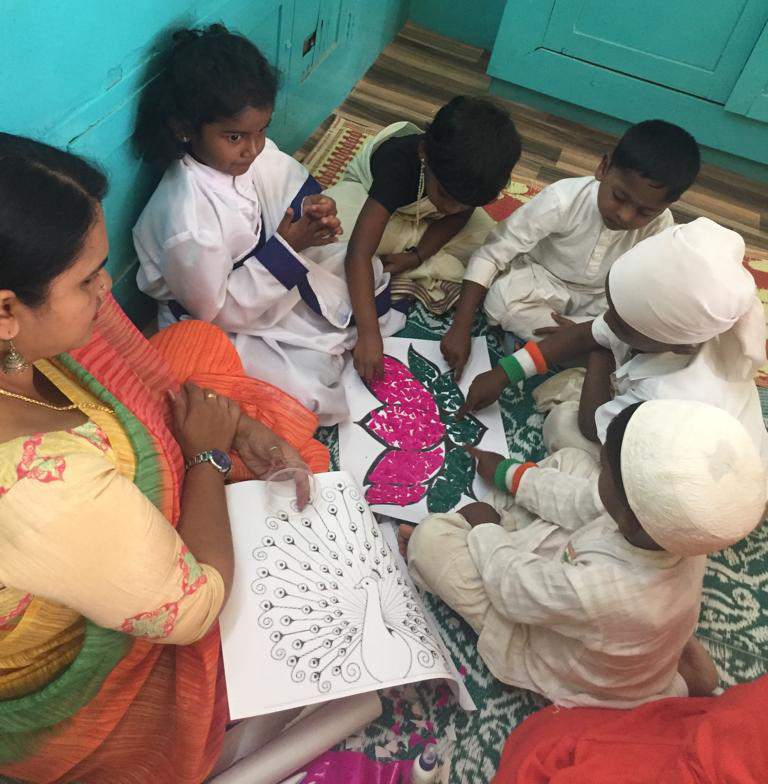
Overview
A complete kindergarten curriculum includes reading, writing and art in the fields of EVS/GK, Math and Language.
Kindergarten method of teaching uses different mediums to help children learn at their own pace while in a social and collaborative environment. Our kindergarten programme plays an important role for the children as it helps them to grow emotionally, physically and mentally in a recommended way.
Curriculum
Most kindergarten children are expected to read and write words by the end of the academic year. They will work on developing fine motor skills as they learn to write the upper and lower case alphabets. They will also attempt to write story, journal entries or poems. Students are also expected to count and write numbers.
A great curriculum is more than just putting together ideas. It is a collaboration of experience, knowledge and understanding of children, and proven methods for helping children learn and succeed.
Kindergarten
Kindergarten follows the Early Years Foundation Stage Curriculum. We plan learning through both our indoor and outdoor environments as well as adult-led group time. Our curriculum overview states the key skills we plan to cover across the year, although this plan is extremely flexible, enabling us to respond to children’s current interests and their next steps in development.
Personal, Social and Emotional Development
- Speak to others
- Try new activities with confidence
-Ask for help
- Play cooperatively, taking turns with support
- Keeps play going by responding to what others are saying or doing
- Aware of own feelings, and knows that some actions and words can hurt others’ feelings.
- Form positive relationships with peers and familiar adults
- Talk about feelings Talk about behaviour
- Begins to accept the needs of others
- Begins to do their work independently
Communication and Language
- Listen to others one to one or in a small group
- Anticipate key Events/Themes in rhymes and stories
- Respond to simple instructions
- Give attention to others
- Follow instructions
- Begin to answer ‘how’ and ‘why’ questions about Events/Themes
- Confident to talk to other children when playing, and will communicate freely about own home and community
- Uses talk to explain what is happening and anticipate what might happen next, recall and relive past experiences.
- Questions why things happen and gives explanations. Asks e.g. who, what, when, how.
Physical Development
- Go to the toilet by themselves most of the time
- Wash and dry their hands mostly independently
- Dresses with help
- Show good coordination
- Move confidently
- Understand to move in straight line and circle
- Negotiate space when running by adjusting speed or direction
- Use one handed tools and equipment (make snips with scissors)
- Observes the effects of activity on their bodies
- Understands that equipment and tools have to be used safely
Literacy
- Recognize and Write Alphabets lower and upper cases in order
- Fills in the missing letter, word or phrase in a known rhyme, story or game
- Distinguishes between the different marks they make.
- Sometimes gives meaning to marks as they draw and paint
- Ascribes meanings to marks that they see in different places.
- Shows interest in illustrations and print in books and print in the environment.
- Beginning to be aware of the way stories are structured
- Recognizes familiar words and signs such as own name and signals/directions.
Mathematics
- Learn Pre-Math Concepts like big-small, thin-fat, in-out, up-down etc
- Select small number of objects 1 or 5
- Begin to recite numbers in order upto 100
- Represent numbers
- Notice simple shapes and patterns in pictures
- Beginning to categorise objects according to properties such as shape or size
- Matches numeral and quantity correctly
- Compares two groups of objects, saying when they have the same number
- Counts by 5s nd 10s
- Takes basic additions and subtractions
Expressive Arts and other extra curriculums
- Joins in singing songs
- Make music
- Enjoys joining in with dancing
- Use media and materials imaginatively
- Sports
- Represent ideas, thoughts and feelings through design technology, art, music, dance, role-play and stories
Field trips
- Park
- Super Market
Themes
Every lesson is taught with a theme to make children understand the concept easily:
Colour Week : Will be introduced to colours with different activities and worksheets during the week.
Family week : Will be taught about different members in the family with help of finger puppets and will be allowed to talk about their families. End of the week students will be able to converse the names of their family members.
Fruits week : Will learn the name, structure and taste of the fruits, which will be taught with different worksheets and activities.
Vegetable Week : Will learn the name, structure and taste of the vegetables, which will again be taught with different worksheets and activities.
Community Helper Week : Duties and importance of community helpers will be explained. Seasons: Types of Seasons will be taught. Changes is climate, types of Clothing and types of food consumed according to the season will be learned and understood.
Sense Organs Week : Names and uses of sense organs will be taught with pictures, worksheets and activities.
General Events and Celebrations
- Mother’s Day / Father’s Day
- Grand Parents Day
- Recitation competition
- Fancy Dress competition
- Drawing / colouring competition
- Eid
- Independence Day
- Teacher’s Day
- Diwali
- Children’s Day
- Christmas
- New Year

